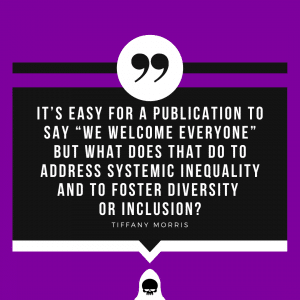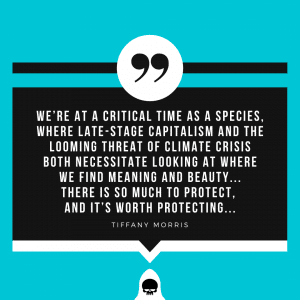Greetings and salutations, Apparition Lit Readers and Submitters!
Today, I’m continuing our new series featuring Q&A interviews with our venerable guest editors. Our guest editors are unique and powerful voices that build our TOCs and provide invaluable input for the editing process.
In our previous edition, we featured Premee Mohamed. Today, we have the alluringly dark and expansive voice of Tiffany Morris, our guest editor for Satisfaction.
Read on to learn about the diverse experiences that make up Tiffany’s horrifying, yet hopeful, work; what she thinks of Apparition Lit’s recent changes to submission guidelines; and if she thinks her character would live longer than mine in a horror film…
Q: Why don’t we start with…what was your experience like working with Apparition Lit? In your edition, what pieces in the TOC were you most excited about and why? What would you want our readers to know about how we choose our TOC?
A: I absolutely loved working with Apparition Lit! As a long-time fan of the magazine, I was honoured to be asked to take a Guest Editor spot. In the Satisfaction issue, the beautiful queer sci-fi of “Sunrise, Sunrise, Sunrise” and the uncanny doppelganger darkness of “You Do What You’re Told” both resonated strongly with me, but I can honestly say that I loved every piece we chose (and a lot that we didn’t). I deeply appreciated the thought and care with which the Apparition Lit team, from slush to final round consideration, gave to the pieces that were submitted. I’m grateful to have had the opportunity to be part of that process. It’s one of my favorite publications for good reason!
Q: Just prior to when you guest edited Apparition Lit, they had changed their simultaneous submission guidelines to allow for BIPOC/LGBTQIA+ writers to sim sub. I recall at the time, when they discussed continuing that practice at our pre-submission meeting, you and I as BIPOC were glad to hear that. In the next issue they expanded their submission timeline for BIPOC who self-identify, and we have found some beautiful pieces in that window. Do you feel these changes are sending strong messages of support and building confidence for our BIPOC submitters? What other ways can we, and other literary publications, enhance accessibility and equity?

A: Yes! I think that sim subs and expanded submission or specialized submission timelines are helpful, at least in my experience. It’s easy for a publication to say “we welcome everyone” but what does that do to address systemic inequality and to foster diversity or inclusion? Can we afford to assume that good will automatically translates into good action? I’m personally more comfortable submitting to places that have a record of accepting work from people of multiple and intersecting identities, and it’s great when a publication demonstrates that they welcome that in a proactive, deliberate, and structural way. I hope that special windows, sim subs, Guest Editor spots, and representative mastheads continue to grow and foster diverse literary communities.
Q: I noticed a slight hopeful tune in some of your work, and I would like to ask if it was intentional? I find that optimism can be a hard sell for dark works, and yours rings authentic and empowering. I’m thinking of the work you published in Apparition Lit, Luna Rasa. The lines in particular, near the climax of the poem… “But then, silent, in/this place with no need to/speak, we found beauty…” The rest of the poem is both reminiscent of decay and warm with love. I also found your fiction piece “To The World Beyond The Sky” to be not just about the end of times, the deep divide and desperation splitting the rich and “working class,” but also the hope that even one survivor, the last girl, Sisip in the story, can tuck away, protect, and carry on life, language, legacy under enormous pressure and change. Do you find that it’s important to include voices of hope in your works? Or are these just momentary fleeting glimpses in otherwise dark tales? What was your experience writing these pieces with such endings?
A: Thanks so much! It’s funny, because I totally love dread-soaked and nihilistic media but can’t seem to not weave hope into some of the stuff that I write, especially if it’s veering more into fantasy or sci-fi than straight-up horror. Maybe it’s my personal preference for philosophies of existential meaning-making as our way out of despair. We’re at a critical time as a species, where late-stage capitalism and the looming threat of climate crisis both necessitate looking at where we find meaning and beauty. Speculative fiction and poetry can be a great way to explore the fear of living on the brink of major catastrophe or transformation, but also to think beyond what we think of as inevitable or the end of the world. There is so much to protect, and it’s worth protecting, even while we rightfully rage and despair at, in, among the ruins. I definitely have nihilistic and pessimistic moments in my work, but I try to make my more hopeful pieces operate in that space of realization and revitalization. I don’t write confessional work, but often my writing is a way of working through my feelings about personal and political states of being.
Q: I loved receiving Havoc in Silence in the mail. It’s both aesthetically a really cool book, but also really gratifying to flip through and see all these experimental poems. For me, I found most to be very rich in texture and scenery. Cinematic at times. It conjured scenes in movies where they have long lingering pans on an antagonist in the distance, or a detailed zoom on a particular piece of gore, and the imagery tells the viewer all they need to know about the story. How did you develop your style, and do you find it continuing to evolve? What suggestions do you have for other experimental poets on how to create their own unique voice?
A: I’m so glad you liked it! Havoc in Silence was written two months after the death of my father, but I was also writing about late-stage capitalism, and putting it all in a horror context: personal apocalypse and a general atmosphere of apocalypse, the strangeness and trauma of that time. I naturally like heavily imagistic writing, and to me the experience of trauma is imagistic and episodic; memories are vivid and disjointed and cyclical, painful and powerful. Trauma is in some ways a disruption of narrative and I needed a disruptive poetry style to tell it. Playing with fragmentation came to me through reading Anne Carson’s translation of Sappho, but other contemporary poets like Jordan Abel and Oana Avasilichioaei do great work with it, as well. Letting language play, break, expand, contract, or just be sparse is so helpful for experimental writing. It allows you to not be afraid to let the meaning be difficult, puzzling, obscured or obscuring.
Q: As a brown/queer horror devotee, I find a lot of horror media isn’t made for me, and it can be hard to find validation in horror-oriented spaces. Be it in forums, conventions, book clubs, or even shows, it feels like horror is still grappling with an all-white identity, despite BIPOC creators and fans proving their metal a thousand times over. How do you balance your identity and experiences with establishing yourself as a bonafide Horror voice, and what recommendation do you have for other horror authors who share your identity(ies)?
A: I think that the momentum of Black Lives Matter last year helped open the horror community’s eyes to a lot of its gaps in representation, and it’s been great to see more strides being made to be inclusive. I hope that trajectory continues. One of the problems is treating the genre, the subculture, and the fanbase as a ‘default’ white space – and that transformation needs to come from within, because, as you said, BIPOC folks have been telling these stories and doing this art and being these fans this whole time. As an Indigenous/settler and bisexual horror writer, I love finding other queer and BIPOC horror voices and seeing how these experiences shape their stories. Writing horror poetry and using my Mi’kmaq language-learning process in my poems kind of makes me a minority of a minority in a subgenre, but that also gives me a lot of room to do my own thing. My advice to other Indigenous, mixed Indigenous, and/or bisexual horror writers would be to do your own thing and know that the small niche means you have more room to invent, not less. Also find me and be my friend! I wanna read your stuff!

Q: Last but not least, as a writer and horror fan in general (as I’ve noticed from your twitter), what are your favorite bad horror tropes? If you were in a horror film, which terrible cast type do you think you’d end up being? I am definitely the “sympathetic friend used as a plot device and killed 2nd to last.” I’m absolutely not the main character, but they keep me around long enough just to make people like me, and so when I die, it’s extra sad for the hero who is now tortured by the loss of their one true loyal companion. Regardless, I’m definitely not making it to the sequel. How about you?
A: Oh, definitely the surly goth gal who dies, like, immediately after sassing a demon or a serial killer. Your character would be so nice about my death while the other characters are like “that freak who we were inexplicably friends with?”
Q: Finally, where can people find you on the internet? Or that is, where do you want to be found?
A: Mostly on twitter! @tiffmorris. I also have a website: tiffmorris.com. Wela’lin for interviewing me and wela’lioq to all who read it!
Until next time, friends!
-
 Marie Baca Villa Blogger/Submission Reader
Marie Baca Villa Blogger/Submission ReaderMarie Baca Villa is a Chicana writer and artist in California. She has a master’s degree in psychology and used her education to build a long career in crime victim advocacy. As a fan of speculative fiction, she loves anything involving strange worlds, complex characters, and unexplained phenomenon. She’s a bonified cat lady, covered in tattoos, and she loves cussing, beer, and flaming hot cheetos. You can find Marie on Twitter @okay_its_marie





